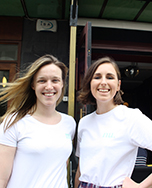Interviews

Names: Alison Kelly (Ali) & Aisling Byrne
TCD Qualifications: Ali: LL.B. & M.Sc. in International Politics (2016)
Aisling: B.A. in Music (2015)
Titles: Co-founders of the business Nu.
About: Nu. is a social enterprise which seeks to establish an affordable and sustainable alternative to the fast-fashion industry. It runs swap-shops around Dublin and is currently developing an application that is an online public wardrobe facilitating the sharing of clothes.
What was the inspiration for setting up Nu.?
Aisling:
Both Ali and I took part in the Overseas Suas Volunteer programme in India in 2013. While there we saw the devastating impact fast-fashion has on people and the environment. We came home with a new perspective but also felt helpless as the problem seemed too large to solve. The idea of Nu. Enterprise was born out of the belief that there is a way of shopping ethically and sustainably. Over the past year we have created a viable solution to the harms of fast-fashion, one where everyone wins including the consumer.
What constitutes a piece of ethically made clothing?
Ali:
There’s no one definition for what constitutes ethical. In fact, even the most conscious brands struggle to ensure that their materials have been produced under fair conditions. There are two considerations to be taken into account for every garment, the environmental impact and the working conditions of the garment workers. Ideally an ethical garment is one that is made of sustainable materials, for example, organic cotton or recycled materials. In relation to labour standards The Fair Wear foundation is a certification that considers the working standards in factories taking into account wages, health and safety and freedom of association rights. This certification confirms that a garment has been made ethically. Another factor is the quality of the clothes if they are poorly made they won’t last and will go into landfill much faster. The retailer Patagonia designs clothes that are made to last and offer a repair service in their shops.
How did you start working together on this business?
Aisling:
We met in Trinity in 2015 when we were both head organisers of Ireland’s largest student run charity event Jailbreak. As a result, we discovered that we were capable of making a positive social impact. The problems of the fast-fashion industry had been playing on our minds and we were determined to find a solution. In order to make sustainable fashion a viable alternative we created an innovative system that would reinvent the way people shop. The Charity Suas was running a social innovation incubator programme and we decided to apply with our social enterprise Nu..
How have your studies at Trinity influenced the vision of your Nu. Business?
Ali
As a law student I was primarily drawn to human rights and international public law. I’m currently studying for a Masters in International Politics, and took a class on globalisation and international development. My studies have helped me to comprehend how fast-fashion began and the systems that affect the global supply chain. My involvement in Nu. influenced my decision to complete my thesis on fair trade and labour rights.
What do you hope to accomplish in the coming months as you work with LaunchBox, the accelerator programme for student start-ups?
Aisling:
The goal is to have more Nu. events and involve people in our anti-fast fashion community. The monthly swap shop in Dublin is steadily growing and we will hold further panel discussions and awareness raising events in the summer. In the coming months our aim is to develop our Share, Swap, Steal application. The idea is to provide an online public wardrobe to allow sharing and swapping of clothes between friends and the wider community.
What is the greatest challenge in establishing an affordable and sustainable alternative to the fast-fashion industry?
Ali:
It is society’s current attitude towards fashion, having cheap and readily available clothes means that there is demand for a constantly changing wardrobe. It’s easier to pick up something new instead of repairing a rip or replacing a button. It’s challenging to slow the pace of consumption, clothes have become disposable and fashion is increasingly subject to change. People perceive ethical fashion to be unfashionable however there are creative ethical designs which have not yet reached mainstream retailers. The purpose of Nu. is for shoppers to move away from having individual closets and instead share, swap and rent clothes so that each garment is worn to its full potential.
What has been your proudest achievement so far with Nu.?
Aisling:
We’ve won a couple of pitching competitions but the best moment was realising that we are influencing the general public. People have seen us on Facebook, read our blog or have heard about us from friends and are excited by what we do.
What are longer term plans for Nu.?
Ali:
We hope to launch the Share, Swap, Steal application in the autumn. Our long term goal is the creation of the Sustainable Fashion Library. This will be a public rental wardrobe that will stock ethical and sustainable brands. The price structure will be on a monthly subscription basis so that members may swap clothes similar to a library service. This will give sustainable brands an opportunity to reach a broader market.

